The third episode of “3 Keys to Raise Quran-Loving Kids” covers the final key, which is the four components of inspiration.
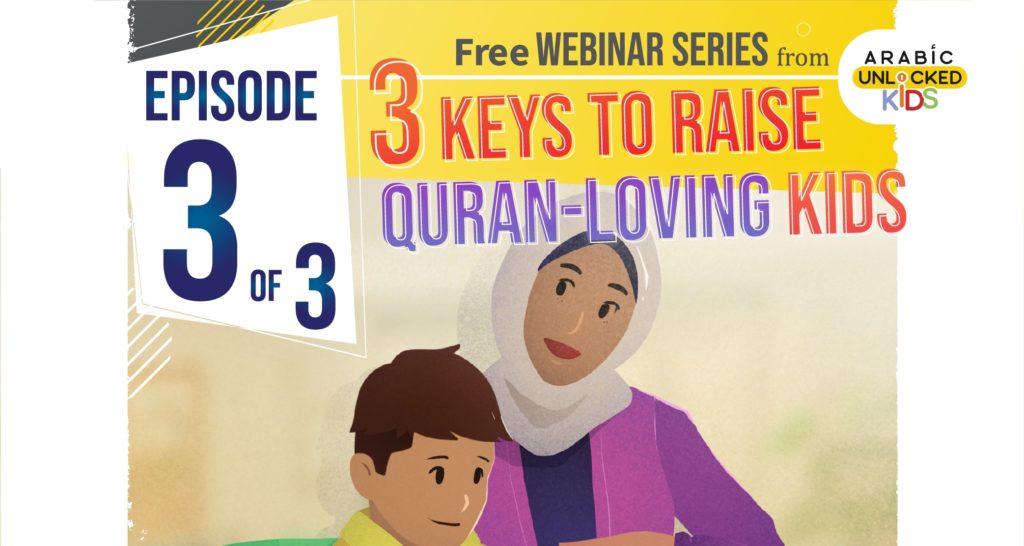
About Assad Masud
Assad came from a non-Arab background and faced the same struggles most users will be facing when learning Arabic as an adult.
He began studying Arabic as an adult and reached fluency within 9 months and then went on to teach Arabic and translate for world-renowned scholars.
In this article, he shares insights from his experience as both a student and a teacher on why inspiration is important to inspire your kids to love the Quran and establish a relationship with the word of Allah SWT.
What You’ll Learn in this Article
- The common pitfalls in the current state of many (not all) Islamic education systems.
- Lessons we can learn and emulate from the Golden Age of Islam.
- The four components of inspiration and how we can leverage it to inspire children to learn and love the Quran.
.
Author: Assad Masud
The Role of Beneficial Knowledge in Our Lives
Seeking beneficial knowledge plays a central role in Islam. The first word revealed from the Quran is iqra, which in its simplest sense means, “read”. This opening sets the premise on the importance of education in shaping Muslims on both the individual level and on a societal level as an Ummah.
The role of beneficial knowledge has been stated numerous times in the Quran and hadith. For example:
وَإِذَا قِيلَ ٱنشُزُواْ فَٱنشُزُواْ يَرۡفَعِ ٱللَّهُ ٱلَّذِينَ ءَامَنُواْ مِنكُمۡ وَٱلَّذِينَ أُوتُواْ ٱلۡعِلۡمَ دَرَجَٰتٖۚ وَٱللَّهُ بِمَا تَعۡمَلُونَ خَبِيرٞ
[Quran 58:11]
“… And when you are told, “Arise,” then arise; Allah will raise those who have believed among you and those who were given knowledge, by degrees. And Allah is Aware of what you do.”
إِذَا مَاتَ الإِنْسَانُ انْقَطَعَ عَمَلُهُ إِلاَّ مِنْ ثَلاَثَةٍ مِنْ صَدَقَةٍ جَارِيَةٍ وَعِلْمٍ يُنْتَفَعُ بِهِ وَوَلَدٍ صَالِحٍ يَدْعُو لَهُ
[Sahih Sunan an-Nasa’i]
“When a man dies all his good deeds come to an end except three: Ongoing charity (Sadaqah Jariyah), beneficial knowledge and a righteous son who prays for him.”
Thus, seeking knowledge and applying it in our lives will, in the end, benefit us in both this world and the next. Just by looking back into history, we can see how the pursuit of knowledge has been a key influence in developing Muslim societies.
How can we inspire our children to seek beneficial knowledge, and in particular, Islamic education? Especially in today’s age of distraction? Before we can answer that question, we need to take a critical look at the current state of Islamic education.
.
A Critical Look at the Current State of Islamic Education
Many—not all—madrasahs or Islamic curriculum in schools today place too much emphasis on reciting and memorising. There isn’t enough focus on understanding the Quran and how it relates to every aspect of our daily lives and the world at large.
As a result, the Quran becomes a “bubble” subject that doesn’t seem relevant to children’s lives. This puts children at risk of becoming distant from the Quran when they grow up. In some cases, the way Islam has been taught may even push children away from loving the religion because of the pressure and punishment they associate with Islamic studies.
This current state of Islamic education is not an isolated situation. Rather, it’s a reflection of the current state of the secular education system at large. Worldwide, education has been reduced into a system of passing exams. This places a lot of pressure on students to memorise and regurgitate information.
This system has largely evolved from the need to support the growth of industrialism. Instead of focusing on the love of learning and nurturing individual talents, the focus is to create as many specialists as possible to fill in the various roles needed in different industries.
The problem with this approach is that it stifles the holistic education of an individual and hampers creativity. Worst of all, it stifles the love for learning because it has transformed the act of seeking knowledge into a boring and stressful treadmill of rote learning and passing exams.
In the beginning of the 21st century, the realisation for the need of holistic education became more prevalent in the mainstream. This led to a resounding call for an education transformation. Homeschooling started gaining popularity because of how it allows a parent to offer the kind of holistic education that the current system doesn’t support.
In recent years, there has been the same growing voice for reform in Islamic education. Many Muslim parents are recognising the need to make Islamic education holistic, fun, and relevant. However, not every parent has the luxury, ability, confidence, resources, or aspiration to homeschool their children.
Clearly, there needs to be a transformation within the Islamic education sphere that can make it easier for parents to teach their children Islam in a holistic manner.
.
A Return to the Golden Era of Holistic Islamic Education
If we were to look back onto the Islamic Golden Age, we will see how education in that period was rooted in holistic principles. Islamic education was not just about memorising and rote learning—rather, it combined multiple aspects of creativity, arts, sciences, and technology.
This is a key reason why the Islamic Golden Age produced educated Muslims who were inspired to create a beneficial impact within their families, communities, and the Ummah at large. Let’s take a quick glimpse at some examples.
Abu Rayhan al-Biruni, a renowned scientist and astronomer, applied the knowledge he gained from physics, mathematics, and astronomy to calculate the direction of qibla from anywhere in the world for the Muslim’s daily prayers.
Fatimah al-Fihri, a scholar who excelled in Islamic jurisprudence (fiqh and hadith), founded the world’s first university, the University of Al-Qarawiynn. This university has educated generations of scholars since the year 859.
These are just a few examples of how seeking beneficial Islamic knowledge in a holistic manner has shaped Muslims who were successful in this world, and InshaAllah, the next world too.
By returning to this holistic approach in Islamic education and breaking away from the industrialised system of education, we can nurture the next generation of children to understand how Islam relates to their lives and their communities.
More importantly, this holistic approach can inspire children to seek knowledge sincerely out of love for Allah, the Prophets, and the Quran. By doing so, we give children the solid foundation to turn to Islam for guidance in every area of their lives, throughout their lives, InshaAllah.
.
Raising Children to Love Learning the Quran
Now that we have covered the importance of holistic Islamic education, the next question to ask ourselves is how can we make learning the Quran and seeking Islamic knowledge something children actually want to do instead of being forced to do it?
Nobody can deny how the modern societies of today live in the age of distraction. From Netflix to Roblox, YouTube, TikTok, and more, many of our children are growing up in an environment where distraction is literally at their fingertips. How do we compete with these distractions?
The simple answer is children need to be internally inspired to learn the Quran.
Internal inspirations are the major drivers of human actions. We are inspired by our own thoughts, feelings or desires. It is the internal motivation that activates us to take action in pursuit of a goal, or in this case, the pursuit of Islamic knowledge.
Many people think inspiration is something that just comes. That’s why you hear people say phrases like, “looking for inspiration” or “struck by inspiration”. And if a parent falls into this trap of thinking, they might think that they simply have to wait for their child to be inspired to learn the Quran.
This can be a grave mistake because the truth is inspiration isn’t something you simply “find” or “get struck by”. Inspiration is actually a skill that can be nurtured when you understand the engine behind inspiration.
.
The 4 Components of Inspiration
Conar Grennan, a NY Times bestselling author, has broken down inspiration into four components: communication, relatability, value proposition, and a road map.
In his article published on HuffPost, he breaks down each component as follows:
- Communication
The message must be communicated, whether through speech, writing, art, or other methods. You must be able to relay the message in a way that will be understood. - Relatability
The message must be relatable. The person receiving the message should be able to see themselves in the message or see how the message can apply to them. - Value Proposition
What value does the message bring to the person receiving it? When the message adds value, whether on a personal or altruistic level, it makes the message important to them. - Road Map
You’ve communicated the message. You’ve made it relatable. And your audience finds it valuable. They are now inspired to take action, but how? This is where providing them with a road map is important so they know what the next steps are to take action.
Let’s look into each component and how it applies to inspiring children to love learning the Quran and seeking beneficial knowledge, InshaAllah.
.
#1 Communication
Allah SWT has chosen to reveal the Quran in the Arabic language. While translations help Muslims connect to the Quran in their own language, the full beauty and nuances of the messages in the Quran can only be appreciated in Arabic.
In my own personal experience as a student learning Arabic, I have discovered how beautiful it is to unlock the language of the Quran, Alhamdulillah. With Allah’s permission, it has led me to experience a new level of connection to the Quran and in prayer, particularly in congregational prayers.
As an Arabic teacher, I have seen many of my students experience the same thing. Removing the language barrier has opened up a new way for them to interact with the Quran without relying on translations, which has transformed how they connect to Islam in various ways, from their worship to their understanding of the religion.
Experiencing and witnessing this for myself has made me a believer and advocate of teaching Arabic to children so they can create this connection with the Quran much earlier in their lives.
Since communication is the first component of inspiration, helping children connect to the language of the Quran is critical to get them to connect with the message.
While children can (and should) still read translations in their native language, not understanding the Quran in Arabic can make learning to read and recite an activity they don’t connect with. This language barrier makes it especially easy for children to become bored or disconnected with the Quran and Islamic studies in general.
.
#2 Relatability
The next important component is making the Quran relatable to what is around them. The best method to make anything relatable to anyone is through storytelling. It is not a coincidence that the Quran and hadith are full of stories to teach us important lessons. After all, Allah the All-Knowing knows the best ways to guide His creation.
When teaching Islamic studies, we should thus use more storytelling than rote learning methods. This doesn’t just make learning Islam more entertaining and fun for children, but it makes it relevant. Children can see how Islamic concepts can apply in their daily lives by seeing how the Prophets of Allah and companions of Prophet Muhammad ﷺ lived their lives.
.
#3 Value Proposition
Next, how can you make children see the value of learning the Quran? It’s not as simplistic as telling them there is heaven and hell, and so they must learn and follow the Quran to be in heaven and avoid hell.
Children—and even adults—need to see the value it brings them in this world. And before that, they need to see the value during the moment.
This is why games, entertainment, and distractions are so addictive. They bring short-term value to people, on the spot. They entertain and they can bring the mind’s attention away from anything that causes them pain or stress. They also cause the brain to release dopamine, the “happy hormone” that makes activities addictive because it makes us happy.
Thus, to make the Quran something children want to learn without being forced to, it first needs to be fun and entertaining. It needs to release that “dopamine hit” that keeps children wanting more.
After this short-term value, Islamic education needs another layer of value that portrays the benefits of applying the lessons of the Quran and Sunnah in their daily lives.
For example, instead of just telling them that missing obligatory prayers and not fasting will incur Allah’s anger, we can tell them stories of how the most successful Muslims in history made prayer and fasting a regular part of their lives. We can explain how prayer helps clear to clear the mind and reduce anxiety, or we can share the scientific benefits of fasting.
By making the value of learning the Quran clear, we can inspire children to love seeking Islamic knowledge, InshaAllah.
.
#4 Road Map
After we’ve made learning the Quran relatable and valuable, what’s next? It’s providing a road map for action.
Action enables students to practice what they have been learning. It gives learners different ways to interact with the material so they can gain a better understanding of what they have been studying. Action that guides a learner to apply Islamic knowledge in the real world will also make the information more meaningful.
When it comes to adults, the road map can be on a higher level of intellect with more abstract or self-directed action items. However, when it comes to children, the actions need to be more direct and interactive.
The ideal road map for children should include games, puzzles, problem-solving, and other similar activities that directly engage their five senses. These activities should not be restricted to solo activities; they should also mix in opportunities to interact with others so that children can benefit from social interaction and social learning too.
.
Arabic Unlocked Kids: A Holistic Road Map of Inspired Islamic Learning
For years, Arabic Unlocked has successfully helped adults unlock the language of the Quran and develop a closer relationship with the message of Allah SWT, Alhamdulillah.
We now aspire to do the same for children by developing Arabic Unlocked Kids—a safe, online learning platform for kids to fall in love with the Quran and Islamic learning.
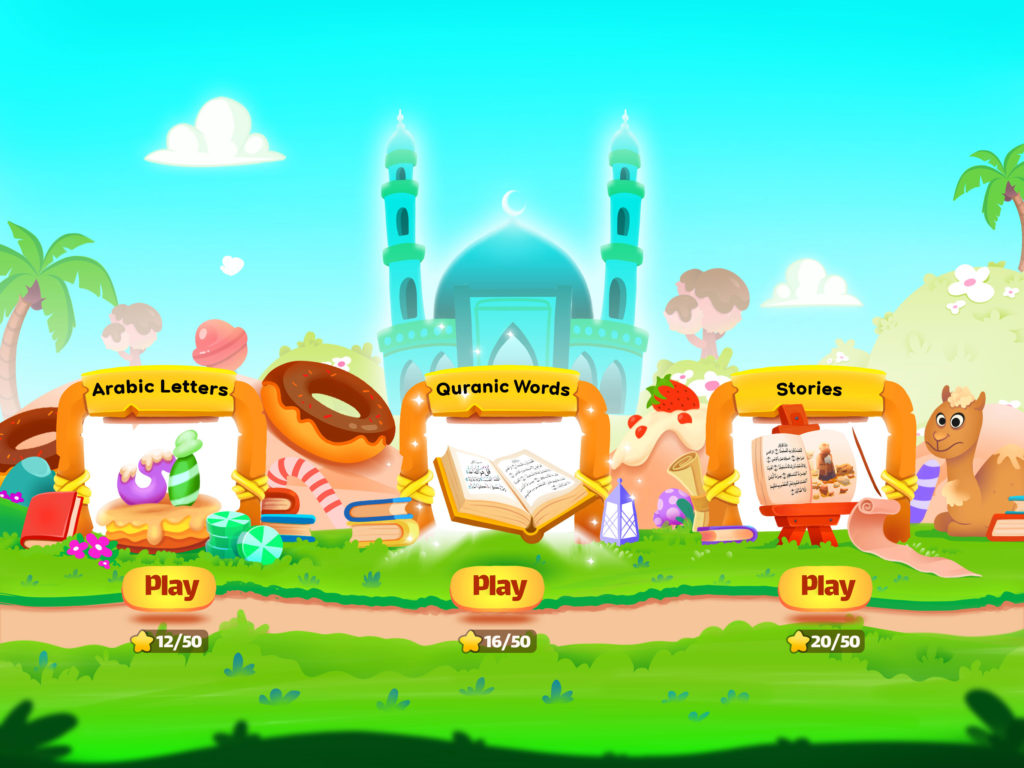
We envision Arabic Unlocked Kids to be more than just fun games to learn the Quran. We envision it to be a curated road map of inspired Islamic learning. This road map will be designed by Arabic education experts and will leverage the four components of inspired learning: communication, relatability, value proposition, and road map of action.
This is why one of the unique features of Arabic Unlocked Kids will be the focus on teaching the Arabic language alongside Quranic and Islamic studies. This is important because communication is the first component of inspired Islamic learning that sets up the foundation for the next three components.
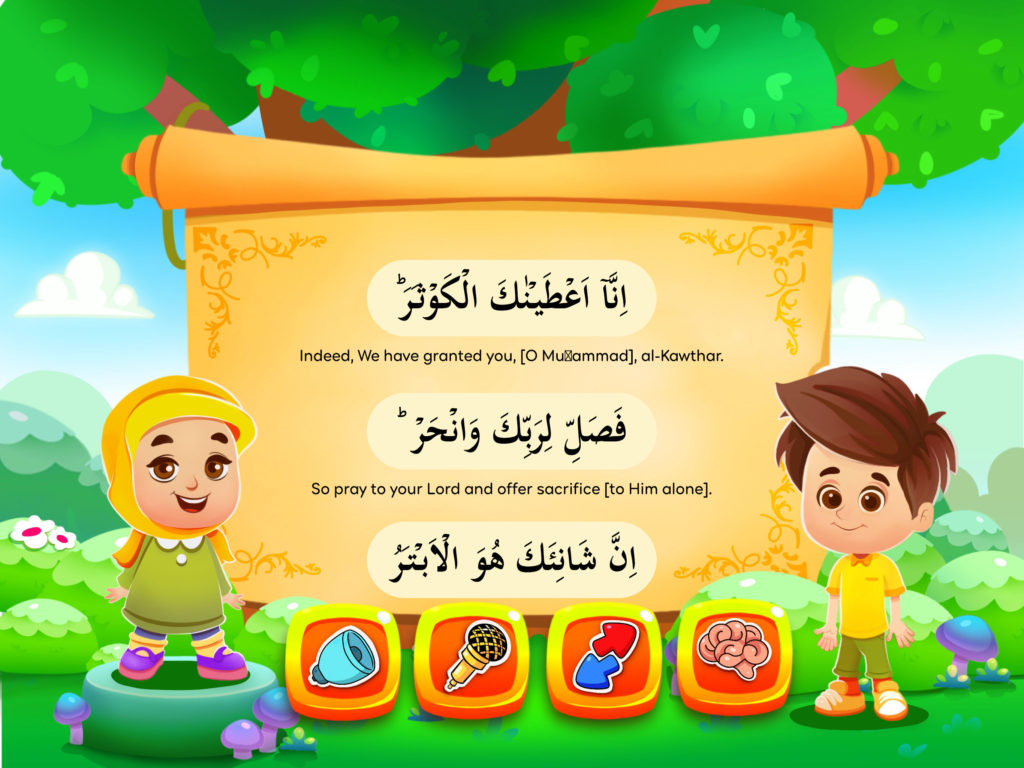
To enhance relatability, Arabic Unlocked Kids will include inspiring stories from the Quran, the Seerah, and the sahabah. To make it fun and valuable, there will be songs and nasheeds that help them solidify and practice what they learn. Plus, exciting hybrid activities to develop all-round skills provide children with a road map of action.
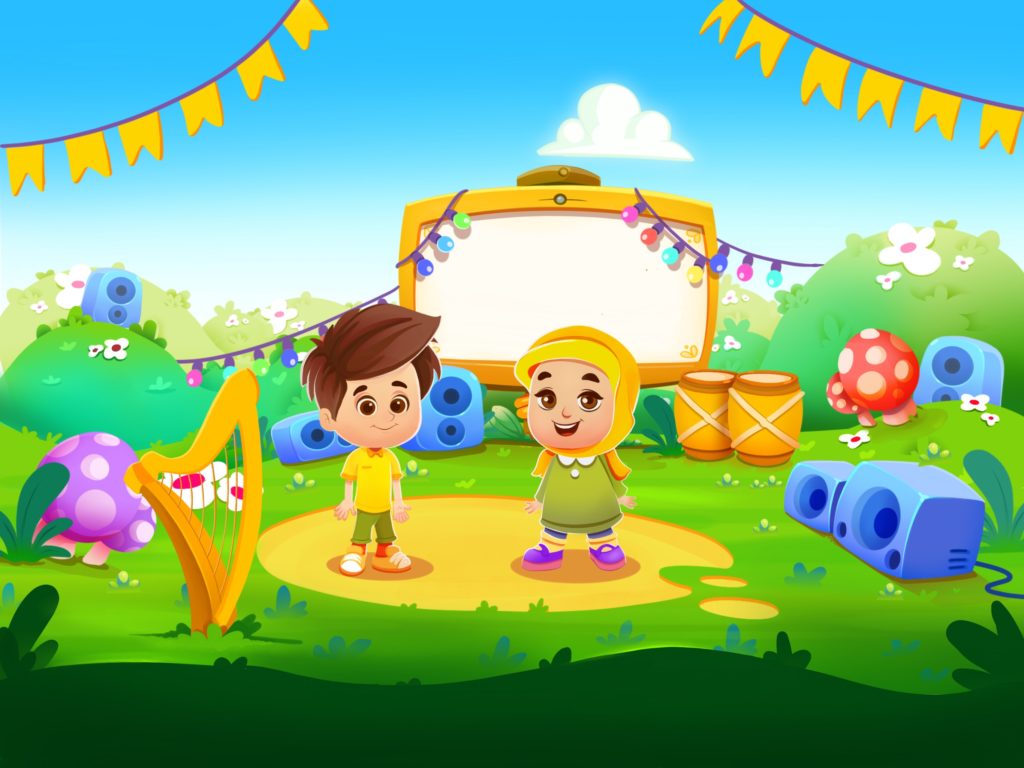
However, our vision for Arabic Unlocked Kids cannot happen without your support. This is why we have launched a crowdfunding campaign on Launchgood to help us develop Arabic Unlocked Kids, and deliver a platform for holistic Islamic education for parents around the world.
InshaAllah, by supporting us to develop and launch Arabic Unlocked Kids, you’ll help countless Muslim children learn Arabic, connect with the language of the Quran, and deepen their connection to Allah’s guidance throughout their lives.
As part of our gratitude, we have various resources and rewards to help children and adults learn or improve their Arabic.
To contribute to our initiative or to help spread the word, visit our Launchgood crowdfunding page here.
Jazakumullah khairan. Assalamualaikum warrahmatullahi wabarakutuh.
.
Support Arabic Unlocked Kids
If you found this episode beneficial, please help us to create more resources like this by supporting Arabic Unlocked Kids.
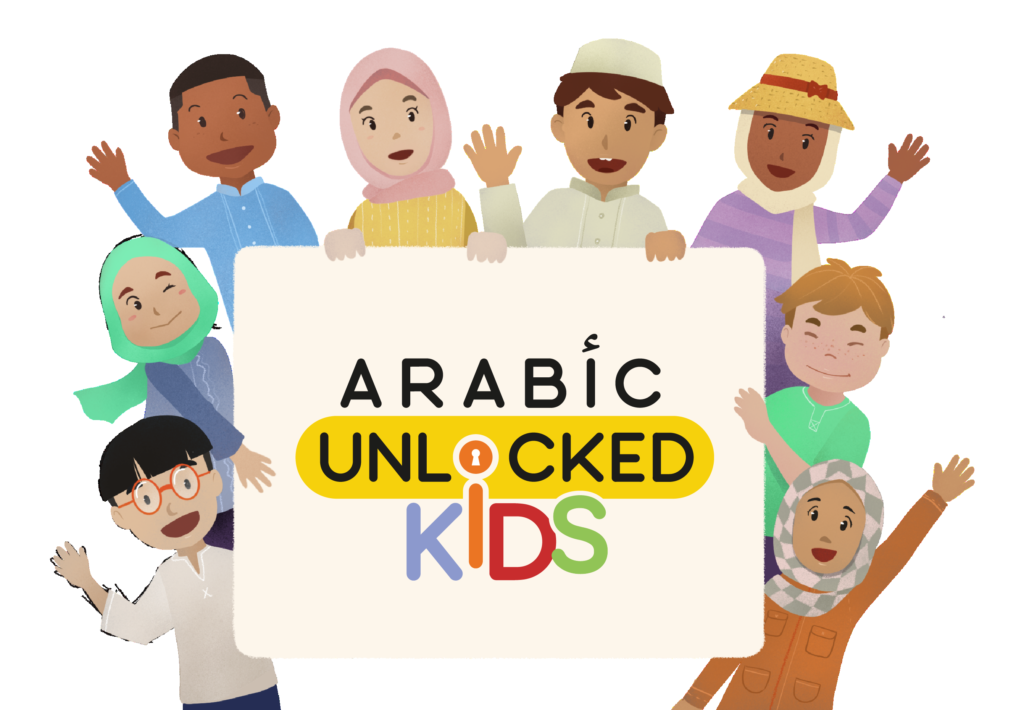
Jazakumullah khairan.

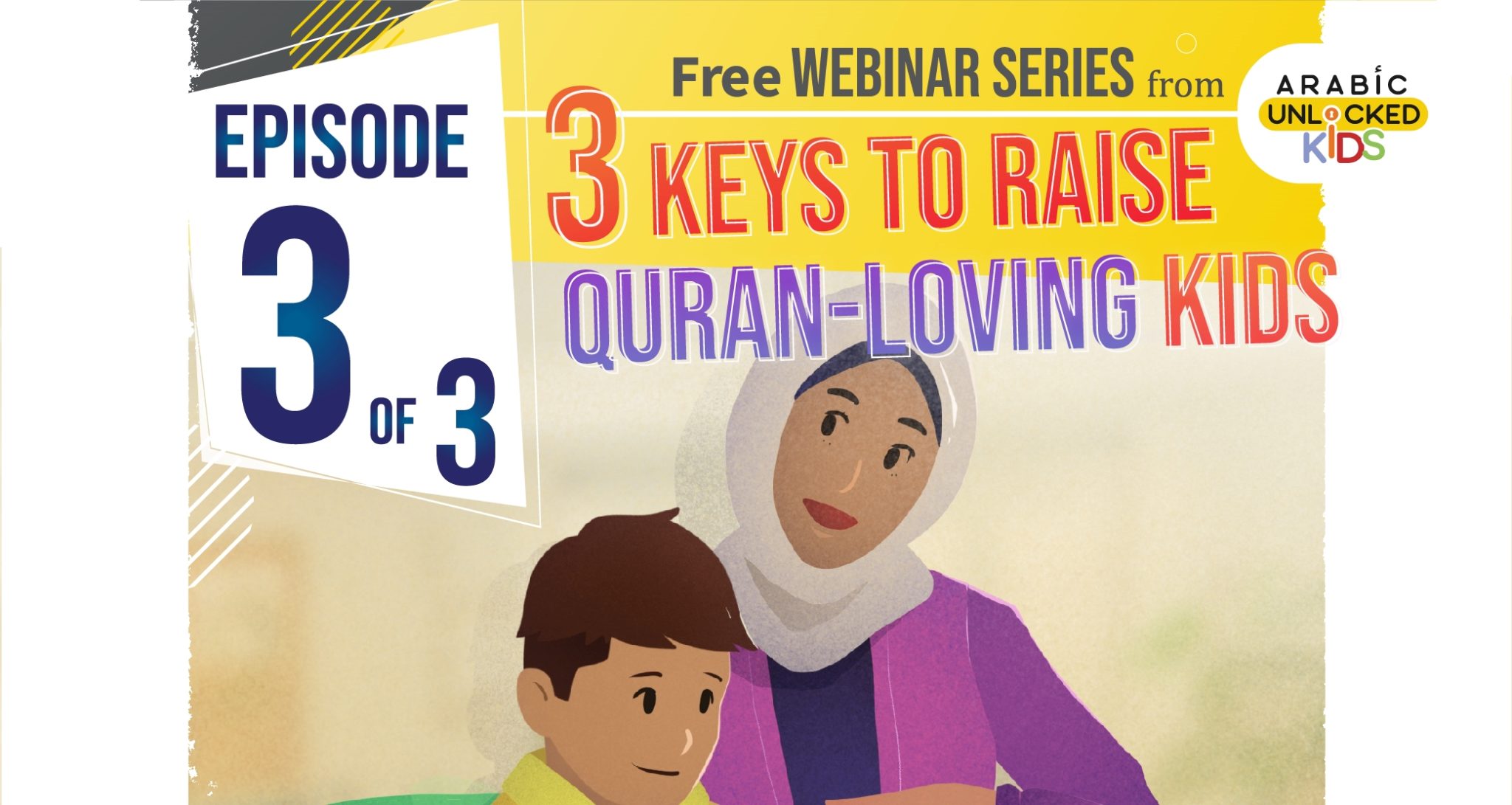
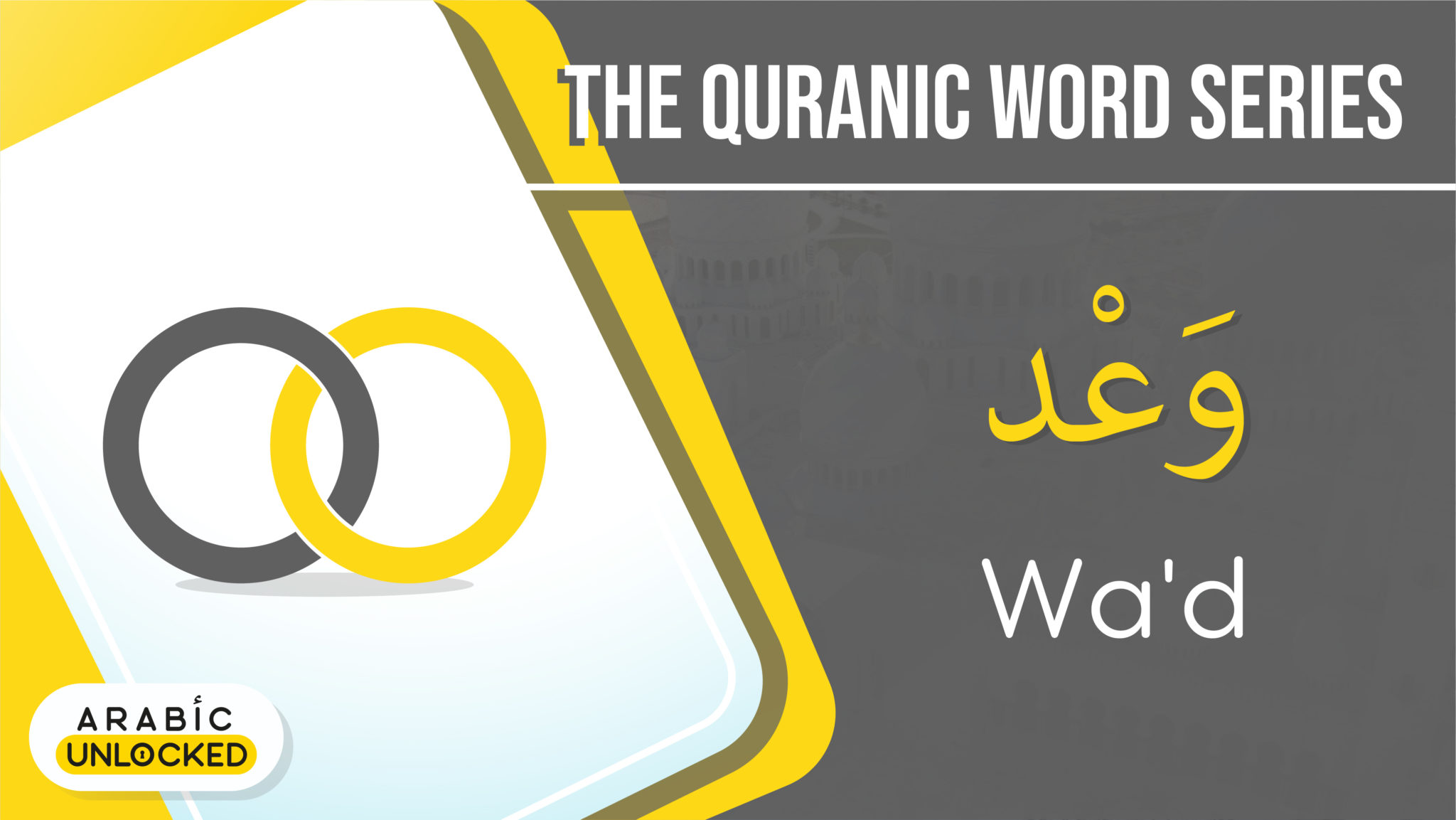
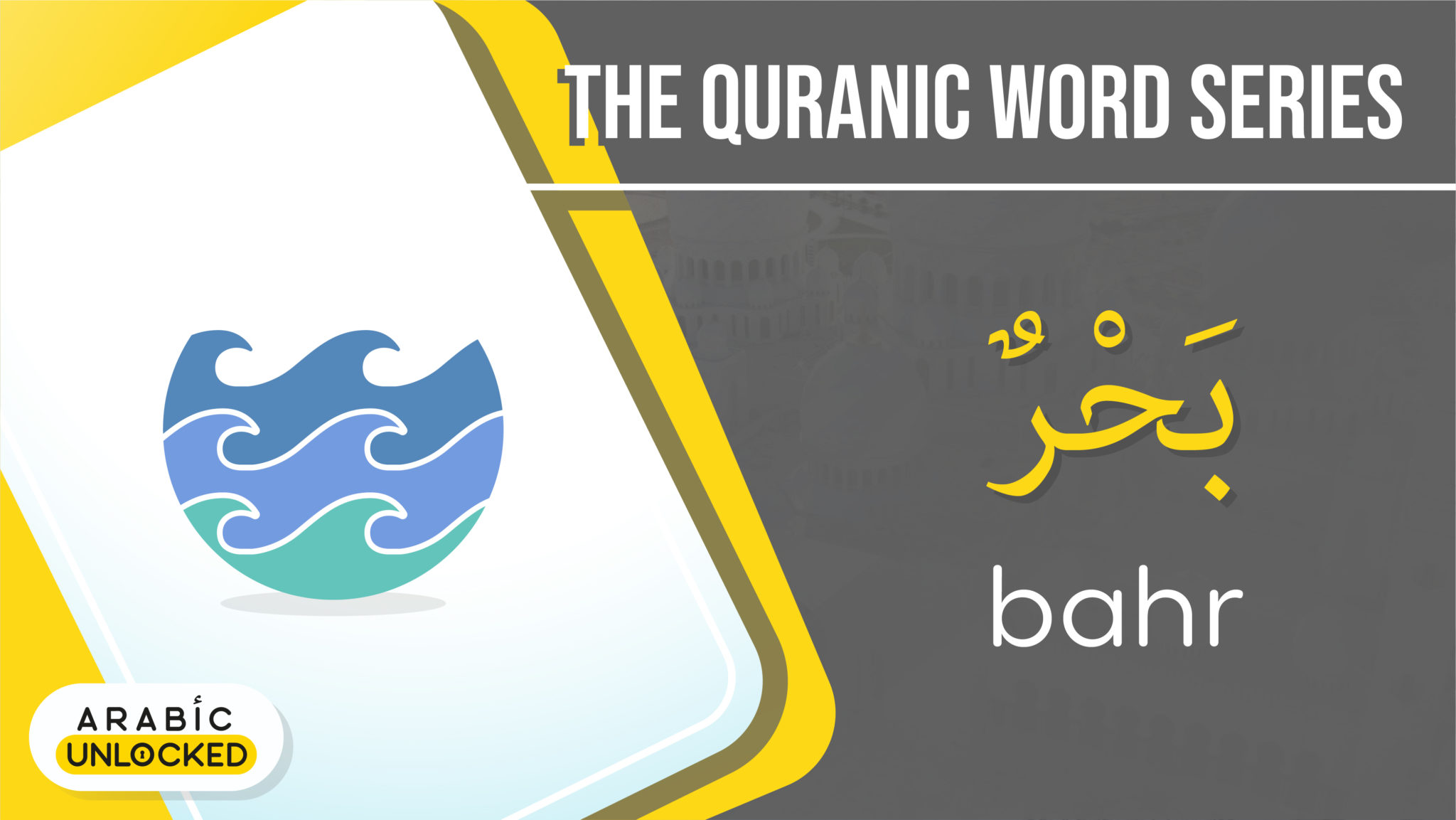
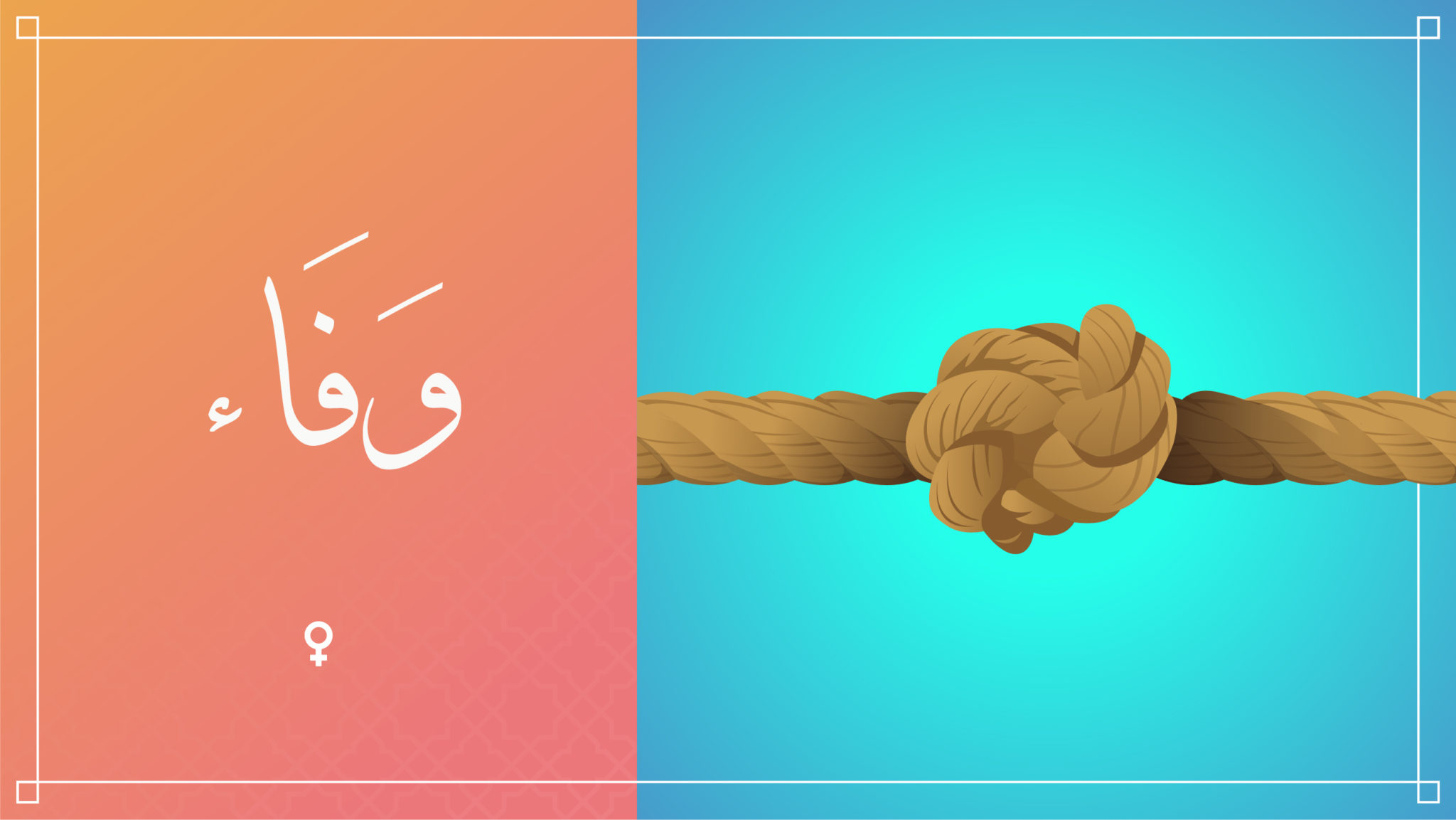

Thank you for this. I’ve been struggling with exactly the things outlined in this post, and it’s helped me think about a way forward for my kids iA
Fantistic
Barakallahu fii
Aslm wrb – is Arabic Unlocked Kids available for purchase?
Waalaikumussalam warahmatullah.
It’s not yet available, but we anticipate to launch it later this year inshaAllah. Meanwhile, you can join the waiting list to be notified of the launch and get a free printable activity book for kids here: http://bit.ly/arabicunlocked-kids
This article reflects the true essence of Islam – peace, love, and compassion. JazakAllah khair for your dedication to spreading these values.
May Allah bless you for these insights …..